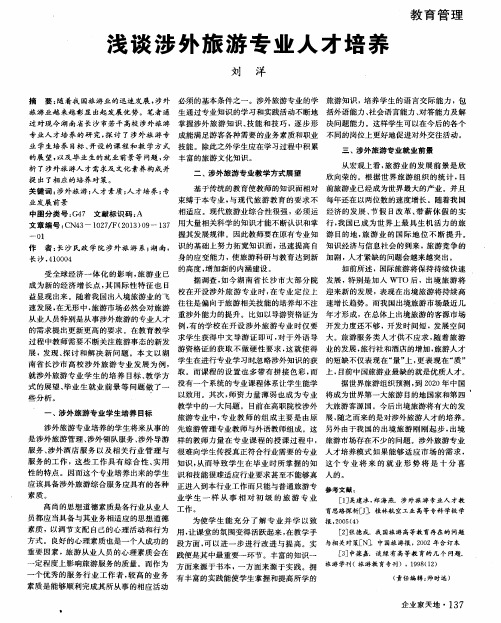浅谈中原崛起中涉外旅游英语人才培养
- 格式:pdf
- 大小:167.92 KB
- 文档页数:2

英语作文-涉外旅游事务管理行业:加强人才培养,提升行业核心竞争力In the dynamic field of international tourism affairs management, the cultivation of talent plays a pivotal role in enhancing the industry's core competitiveness. Talent development not only ensures a skilled workforce but also fosters innovation and sustainability within the sector. 。
The tourism industry, particularly concerning international affairs management, demands a multifaceted approach to talent development. Firstly, educational institutions and training centers must tailor their curricula to meet the specific needs of this specialized field. Courses should integrate practical knowledge of international relations, cultural sensitivity, hospitality management, and business acumen. By equipping future professionals with a diverse skill set, educational programs can produce graduates capable of navigating the complexities of global tourism dynamics.Moreover, internships and apprenticeships are invaluable in bridging the gap between theoretical learning and practical application. Industry partnerships with educational institutions facilitate real-world experiences for students, allowing them to develop industry-specific skills under the guidance of seasoned professionals. Exposure to various operational aspects, such as customer service in diverse cultural contexts, crisis management, and sustainable tourism practices, prepares emerging talents to handle the challenges inherent in international tourism affairs management.Furthermore, continuous professional development is essential for sustaining competitiveness in the global arena. Industry leaders and organizations should invest in ongoing training programs and workshops to upskill existing talent. These initiatives not only update professionals on emerging trends and technologies but also promote a culture of lifelong learning within the workforce. By fostering a learning environment that encourages innovation and adaptation, organizations can stay ahead in the rapidly evolving landscape of international tourism affairs.In addition to technical skills, soft skills such as communication, negotiation, and cross-cultural understanding are crucial for effective international affairs management. Professionals must be adept at building relationships with stakeholders from diverse backgrounds, understanding local customs and regulations, and mitigating cultural misunderstandings. These interpersonal competencies are often the differentiating factors in delivering exceptional guest experiences and maintaining sustainable tourism practices worldwide.Furthermore, leveraging technology is imperative for enhancing operational efficiency and guest satisfaction in international tourism affairs management. Digital platforms for booking, customer service, and destination management enable seamless interactions and personalized experiences for travelers. Moreover, data analytics and market research provide valuable insights into consumer behavior and preferences, allowing organizations to tailor their offerings and marketing strategies accordingly.In conclusion, the success of the international tourism affairs management industry hinges significantly on the cultivation of talent. By investing in comprehensive education, practical training, continuous professional development, and leveraging technological advancements, stakeholders can elevate the industry's core competitiveness. Ultimately, a skilled and adaptable workforce is the cornerstone of sustainable growth and excellence in global tourism management.。

浅谈旅游英语专科学生的人才培养【摘要】笔者依据一套调查问卷,调查了河北科技师范学院旅游英语专科大三学生的跨文化交际能力实际情况,并依据旅游英语专业学生的人才培养目标,提出了一些教学中的改进方法。
【关键词】旅游英语;跨文化交际;人才培养;文化0 前言旅游英语专业学生是对外的文化传播者,是宣传旅游文化的主力军。
不论是从事涉外饭店还是英语导游工作,与客人都是进行面对面的直接服务,而且主要提供的都是语言服务。
他们的跨文化交际能力和水平高低直接影响着本土旅游文化的对外传播与整体形象。
这无疑给旅游英语人才的培养带来了更大的挑战。
基于研究并结合作者的教学经验,本文将提出一些有关如何培养旅游英语专业学生跨文化交际能力的方法和建议,以培养跨文化交际能力为目的,将语言教学和文化教学相结合,使学习者在未来的跨文化交际中取得成功。
1 研究方法和内容结合当前旅游英语专科学生英语语言和交际能力发展的实际,设计了一套学生跨文化交际能力调查问卷,对河北科技师范学院参加过实践的60名旅游英语专科大三学生进行了问卷调查。
调查问卷围绕以下几个问题展开:第一,旅游英语专业学生跨文化交际能力如何。
第二,旅游英语专业学生对不同国家文化的掌握情况,交往时是否具有文化障碍,老师在文化教学方面有没有给予足够的重视,是否侧重文化教学。
第三,在遇到交际障碍时的应对情况。
2 发现的问题及解决途径高校旅游英语专业人才培养的目标是培养具有扎实的英语基本功,掌握涉外旅游所必需的基本知识和基本技能,具备从事涉外旅游工作的综合素质的高等应用型导游及酒店管理人才,但实际情况与预期目标有所差距,具体表现在以下方面:1)旅游英语专科大三学生的跨文化交际能力偏低;2)语言能力不强,口语表达有待提高,反应在教学中的问题是教师缺乏系统的口语练习指导;3)文化差异意识较弱,没有特别重视文化教学;4)在遇到语言障碍时,多数表现出紧张,不知所措,没有很好的应对措施,缺乏自信。
作为教育的关键性问题之一,人才培养模式至关重要,它指的是为实现培养目标而采取的培养过程的构造样式和运行方式,主要包括培养目标、素质与能力结构、专业设置、课程模式、培养途径模式和师资队伍等构成要素。

高职旅游人才涉外语言能力培养研究随着中国旅游业的不断发展壮大,旅游行业对人才的需求也在不断增加。
随着旅游业国际化趋势的加快,涉外语言能力成为旅游人才必备的重要素养之一。
对于高职院校来说,如何培养学生的涉外语言能力成为了一个亟待解决的问题。
在这样的背景下,本文将着重探讨高职院校旅游专业学生涉外语言能力培养的研究,并提出相应的策略和建议。
我们需要理解什么是涉外语言能力。
涉外语言能力是指在跨文化背景下有效地运用外语进行沟通、交流和合作的能力。
对于旅游专业学生来说,涉外语言能力不仅包括基本的外语词汇和语法知识,更重要的是要具备与外国游客沟通的能力,包括听、说、读、写以及跨文化交际技能等方面的能力。
针对这些要求,高职院校在培养旅游专业学生涉外语言能力时需要有针对性地进行设计和实施培养计划。
在培养旅游专业学生涉外语言能力时,首先需要建立一套全面的培养计划。
这个计划需要包括学习外语的课程设置、教学方法与手段、考核评价体系等方面的内容。
针对课程设置来说,应该充分考虑到学生在实际工作中需要用到的外语技能,例如酒店预订、旅游路线介绍、文化交流等方面的内容,为学生提供相应的语言训练。
教学方法与手段方面,可以采用多媒体教学、互动教学等方式,为学生创造真实的语言环境,提高他们的语言运用能力。
在考核评价体系方面,则需要建立多元化的评价方式,包括口语、听力、阅读、写作等方面的考核,以全面评价学生的涉外语言能力。
需要充分利用校外资源,为学生提供更广阔的语言实践机会。
在现实生活中,学生可能较少接触外国游客,因此在校外的实习、实训等环节需要加强涉外语言能力的训练。
比如可以与国外的旅游机构合作,为学生提供海外实习的机会;或者在国内开设模拟的国际旅游服务场景,让学生在实践中提高涉外语言能力。
除了上述两点,还需要加强师资队伍建设,提高教师的涉外语言能力。
教师是学生涉外语言能力培养的关键环节,其自身的涉外语言能力和教学水平直接关系到学生的学习效果。


文化走出去背景下的中译外人才培养模式探索随着中国经济的不断崛起和对外交流的日益频繁,文化走出去成为一个焦点。
在这种背景下,中译外人才的培养变得尤为重要。
本文将探讨文化走出去背景下的中译外人才培养模式,从培养目标、课程设置、实践环节和教师队伍等方面进行探索和分析。
一、培养目标文化走出去需要大量具有良好中外语言能力和跨文化沟通技巧的中译外人才。
中译外人才培养的目标应该是要求学生具备良好的中文和外语水平,并且能够准确理解和传达不同国家和地区的文化背景和价值观念,同时通过跨文化沟通技巧实现有效的信息交流和文化传播。
培养目标要求学生在语言能力、跨文化沟通和文化理解等方面都具备较高的素质。
二、课程设置中译外人才培养的课程设置需要结合中文、外语、跨文化交流和翻译理论等多方面的知识。
在中文方面,学生需要学习中国的语言、文学、历史和传统文化等知识,使其对中国文化有深刻的理解。
在外语方面,学生需要学习目标语言的语言知识和文化背景,使其对目标语言的理解和运用能够达到专业水平。
还需要开设跨文化交流和翻译理论的课程,使学生能够掌握相关的理论知识和实践技能,为将来的工作做好准备。
三、实践环节中译外人才培养模式需要注重实践环节的设置,以提升学生的实际翻译能力和跨文化交流技巧。
学生可以通过参与志愿者活动、国际交流项目、翻译实习等途径,锻炼自己的语言表达能力和跨文化交流技能。
在实践环节中,学生可以结合课程学习的知识,与外国人进行交流,翻译和传播中国的文化,提升自己的综合素质。
通过实践环节的参与,学生能够更好地将学习到的知识和技能运用到实际工作中,提升自己的竞争力。
四、教师队伍中译外人才培养模式需要建立一支专业化、国际化的教师队伍,以保证教学质量和学生的培养效果。
教师需要具备专业的语言能力和翻译能力,同时还需要了解不同文化背景下的语言和交流特点,能够引导学生进行专业化的学习和实践。
教师还需要具备国际视野和跨文化交流技能,能够引导学生进行国际交流和合作,提升学生的综合素质。

浅谈涉外导游人才的英语实践能力培养作者:谷丽丽来源:《广东蚕业》 2019年第4期谷丽丽(长春职业技术学院吉林长春 130000)摘要近些年来,随着我国旅游业的发展,对具有高素质的导游人才需求量也日益加大。
而英语作为一门国际通用语言,使用范围广,缺少大量具有英语实践能力的导游人才,成为了旅游业的急待解决的问题。
文章就以培养优秀人才为责任的各大高等院校角度,讲述如何为旅游业解决这一问题,培养出优秀的具有英语实践能力的涉外导游人才。
关键词导游人才;实践能力;旅游业;英语口语中图分类号:H319 文献标识码:C 文章编号:2095-1205(2019)04-108-02近些年来,生活水平的提高,生活理念的转变,让旅游业成了炙手可热的行业。
而我国由于国土面积大,不乏风景名胜,历史久远,人文文化也是丰富多彩,这些都随着我国综合实力的迅猛发展,受到来自全世界人们的关注。
因此,中国也成了各国人民出国游的热门城市。
这对我国来说,不仅带来了好处,也对我国旅游业发展提出了新的要求,需要大量涉外导游人才,尤其是具有英语实践能力的涉外导游人才。
那么,如何才能培养出能够适应当前需求的导游人才?高校应该实行哪些措施?1 为培养具有英语实践能力的涉外导游人才,高校可实行的措施1.1 注重学生英语口语培训学生在学习英语时经常出现的一个问题就是,学到的更多是书面英语,“哑巴英语”,会做题,但是不会日常的口语应用,或者说出来的是“中式英语”。
但作为导游,最首要掌握的英语技能就是日常英语口语交际。
可在正常的学校教育中,往往考试中都是考察的书面英语,而对口语英语和应用英语的教育重视程度不够。
但归根究底,学生们学习英语并不是为了会做题,会背单词写句子,是为了能够在将来的工作与生活中应用上。
因此,高校要想培养涉外导游人才,就必须重视对学生英语口语交际能力的培训1.2 引入优秀外教,利用新媒体教学方法,为学生打好英语口语基础学校仅仅重视对学生的英语口语培训还不够,大部分的英语老师都是在国内接受的教育,因此,她们的英语水平即便达到要求,但以英语作为母语的人,他们所说的英语更日常化,不会在课本上出现,因此,教师在根据课本内容授课的时候就有了一定的局限性。
文化走出去背景下的中译外人才培养模式探索近年来,中国的经济和文化在国际舞台上日益崛起。
作为世界上最大的人口国家之一,中国的文化正在以前所未有的速度向全球传播。
这就需要培养一批擅长中英文翻译的外籍人才,以促进中国文化走出去的进程。
本文将探讨适应文化走出去背景下的中译外人才培养模式。
中译外人才培养模式需要注重培养学生的语言能力。
外籍学生作为中译外人才,首先需要精通中文和英文。
他们需要具备良好的中文语言表达和写作能力,以便能够准确地传递和表达中文文化的内涵。
他们还需要具备出色的英文表达能力,以便能够将中文的文化信息翻译成准确的英文版本。
在培养中译外人才时,大学可以开设专门的语言课程,注重中文和英文的语法、词汇、阅读和写作训练,以提高学生的语言能力。
中译外人才培养模式需要注重培养学生的跨文化交际能力。
外籍学生作为中译外人才,不仅需要懂得中文和英文的语言表达,还需要了解中西方文化的差异。
在进行文化翻译的过程中,如果没有足够的了解和认知,很容易产生误解和误译。
培养学生的跨文化交际能力是非常重要的。
大学可以开设专门的课程,如中国文化介绍、跨文化交际学等,教授学生有关中西方文化差异的知识和技巧,提高学生的跨文化交际能力。
中译外人才培养模式还需要注重培养学生的专业知识和能力。
外籍学生作为中译外人才,需要具备良好的翻译技巧和专业知识。
他们需要了解中文和英文的语法、词汇以及翻译原理和技巧,以便能够进行准确和符合语境的翻译。
他们还需要了解不同领域的专业知识,以便能够进行相关领域的翻译工作。
培养学生的专业知识和能力是非常重要的。
大学可以开设专门的翻译课程,如翻译理论、翻译实践、专业领域翻译等,以提高学生的翻译技巧和专业知识。
适应文化走出去背景下的中译外人才培养模式应注重培养学生的语言能力、跨文化交际能力和专业知识和能力。
只有全面培养外籍学生的各项能力,才能满足中国文化走出去的需求,并为文化交流和传播作出积极贡献。
文化走出去背景下的中译外人才培养模式探索随着中国在全球舞台上的崛起和国际交流的日益增加,中译外人才的需求也变得越来越迫切。
文化走出去的背景下,需要培养一批能够熟悉中国文化并且具有良好翻译能力的外国人才,以加强中外文化交流和沟通。
中译外人才的培养模式需要考虑以下几个方面。
基础教育的培养。
中译外人才首先需要掌握中国的语言和文化知识。
在基础教育时期,可以加强对外语和中国文化的学习,培养学生的语言表达能力和跨文化交流能力。
还可以推广中国文化的教学,让学生了解中国的历史、传统和习惯,以便他们能够更好地理解和翻译中国的文化内容。
专业教育的培养。
中译外人才需要具备良好的翻译技巧和专业知识。
可以设立中译外专业,培养学生的翻译能力和跨文化交流能力。
教学内容可以包括翻译理论、翻译实践、传媒翻译、文化翻译等方面的知识。
还可以结合实际案例和训练,让学生进行翻译实践和跨文化交流的模拟操作,提高他们的实际应用能力。
实践机会的提供。
中译外人才的培养不仅需要理论的学习,还需要实践的锻炼。
可以通过与外国机构和组织合作,提供实际的翻译工作岗位和项目,让学生能够在实践中提高自己的翻译能力和跨文化交流能力。
还可以举办国际会议、文化交流活动等,为学生提供交流的机会,让他们与外国人士进行实际的文化对话和交流。
终身学习的支持。
中译外人才的培养是一个长期的过程,需要不断更新和学习。
可以建立专门的翻译和跨文化交流机构,为中译外人才提供终身学习的支持和培训机会。
可以设立专门的进修班和研修班,提供进一步学习和研究的机会。
还可以邀请国际知名的翻译和专家学者来进行讲座和指导,引入国际先进的翻译理论和实践,推动中译外人才的不断进步和创新。
中译外人才的培养模式需要综合考虑基础教育、专业教育、实践机会和终身学习等方面。
只有通过多方面的努力和支持,才能培养出具备良好翻译能力和文化交流能力的中译外人才,为文化走出去提供坚实的支持和保障。
英语作文-涉外旅游事务管理行业:加强人才培养,培养专业化旅游管理人才In recent years, the tourism industry has experienced rapid development, especially in the field of outbound tourism. With the increasing number of people traveling abroad, the demand for professionals in the field of international tourism management is also on the rise. In order to meet the needs of the industry and improve the overall quality of tourism services, it is essential to strengthen the training of talents in the field of international tourism management.First and foremost, it is important to establish specialized education and training programs for international tourism management. These programs should focus on providing students with comprehensive knowledge and skills related to international tourism, including but not limited to destination management, cultural awareness, language proficiency, and customer service. By offering specialized courses and practical training, educational institutions can ensure that graduates are well-prepared to meet the demands of the industry.Additionally, collaboration between educational institutions and industry partners is crucial for the effective training of professionals in the field of international tourism management. By establishing partnerships with travel agencies, tour operators, and other relevant organizations, educational institutions can gain valuable insights into the latest trends and developments in the industry. This collaboration can also provide students with opportunities for internships, field trips, and other practical experiences, which are essential for their professional development.Furthermore, it is important to encourage continuous learning and professional development among professionals in the field of international tourism management. The industry is constantly evolving, with new technologies, trends, and customer preferences emerging all the time. Therefore, professionals should be encouraged to participate in workshops, seminars, and other training programs to stay updated with the latestdevelopments in the industry. By investing in the continuous learning and development of professionals, the industry can ensure that its workforce remains competitive and capable of delivering high-quality services.In conclusion, the field of international tourism management requires a steady supply of well-trained and highly skilled professionals. By establishing specialized education and training programs, fostering collaboration between educational institutions and industry partners, and promoting continuous learning and professional development, the industry can ensure that it has the talent pool necessary to meet the demands of the growing outbound tourism market. With a focus on talent development, the industry can continue to thrive and provide exceptional services to travelers around the world.。